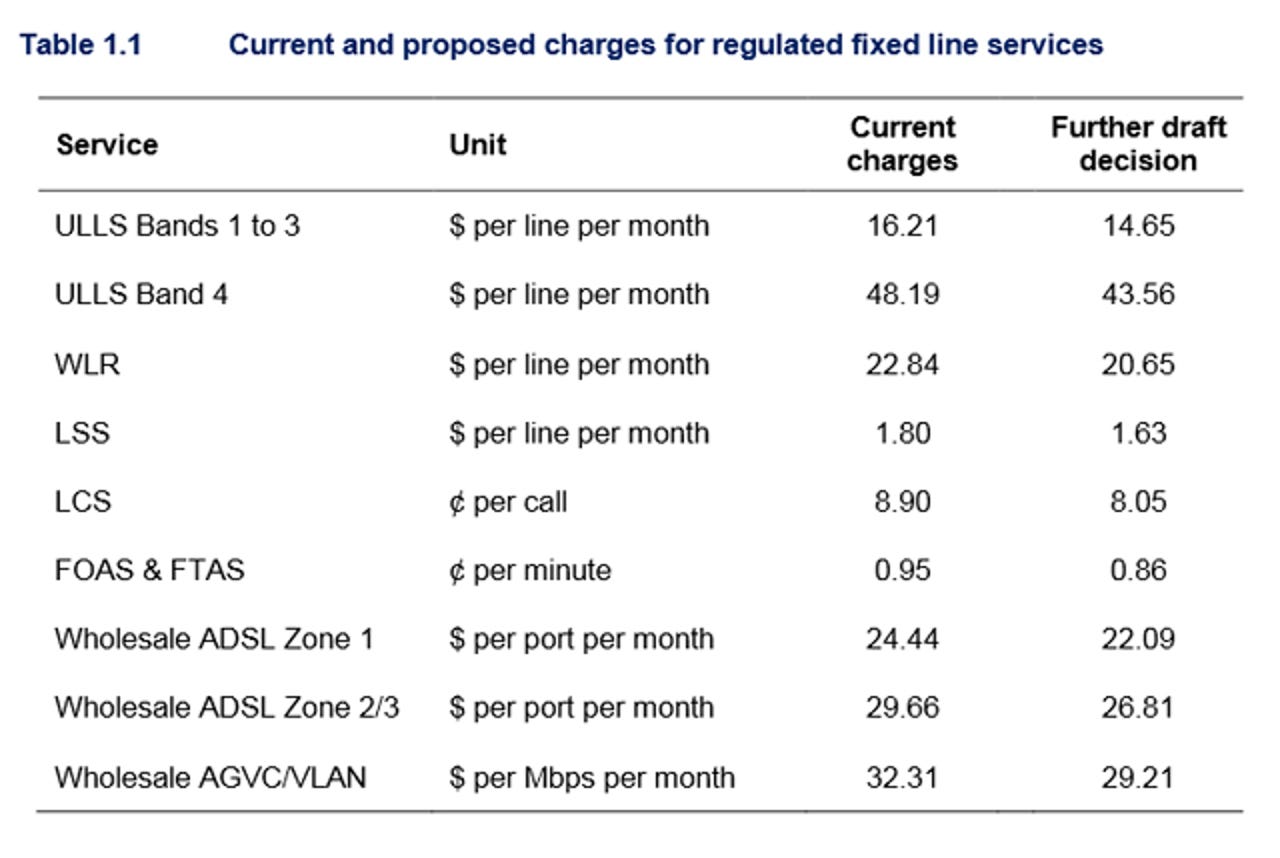Competition watchdog slashes Telstra wholesale broadband prices

The Australian Competition and Consumer Commission (ACCC) had drastically cut the amount Telstra can charge retailers for broadband internet services, after carefully analysing the telco's own numbers on the cost to run the legacy copper service during the transition to the National Broadband Network (NBN).
The watchdog had originally planned to reduce prices across seven fixed-line wholesale services by 0.7 percent, but in a revised decision has said that access prices across the services will need to be cut by 9.6 percent from October this year.
The ACCC said its decision in March did not have enough information backing it. Telstra at the time was arguing that it should, in fact, be allowed to increase prices on fixed-line services, because as Telstra hands over portions of the network to NBN as part of the multi-technology mix, Telstra would lose the economies of scale and face higher costs to maintain and run the network.
The ACCC said that based on further information provided by Telstra on its costs in shifting to the NBN, and analysis from Analysys Mason, it has opted to increase the price cut to 9.6 percent.
ACCC chairman Rod Sims said that customers stuck on the legacy Telstra network during the transition to the NBN should not have to pay higher costs for the privilege.
"If there is no adjustment for these higher costs, then customers who have not been migrated to the NBN will pay significantly higher prices for copper-based services. Eventually, these prices would reach absurd levels for the unlucky last copper customers," Sims said.
"Our draft decision is that assets that become redundant as a result of migration will be removed from the asset base. Also, users of the copper network will not pay the higher prices that result from the loss of scale efficiencies as the number of services remaining on the copper network falls."
Latest Australian news
Sims said that Telstra had the opportunity in its negotiations with NBN over the revised AU$11 billion deal to ensure it received consideration for the impact the migration to the NBN would have on its network.
Telstra said it was disappointed by the draft decision.
"The ACCC is at odds with all the data, which shows per-unit costs on the copper network are set to rise, not fall, over the next few years," a spokesperson for Telstra said.
The spokesperson said that the ACCC had "overlooked" what the NBN deal was about.
"The deal does not account for costs incurred on our legacy network in the switch to the NBN. Indeed, if the ACCC reduce access prices on the legacy network, they risk making the transition to the NBN harder for everyone -- consumers, industry, and NBN Co."
The Telstra spokesperson said the company would work with the ACCC towards the final decision so it could "reflect actual costs and treat all users of the network equally".
Optus was quick to welcome the decision.
"The proposed prices are based on Telstra input data, which demonstrates that as Telstra transitions to the NBN, its unit costs to supply fixed-line services will decline. This reduction in costs of supply will now be reflected in access prices. Telstra may argue that it will incur additional costs to support the rollout of the NBN, but as the ACCC decision indicates, these costs should not be recovered in access prices," the spokesperson said.
The Competitive Carriers Coalition (CCC) -- made up of telecommunications companies other than Telstra -- said it was cheeky of the company to ask retailers to pay for the network while the company is also getting paid by NBN.
"Telstra's argument that it needed to be compensated by competitors and consumers for the equipment it turns off as it is replaced by the NBN was always an extraordinary claim," CCC chairman Matt Healy said.
"Telstra negotiated a handsome payout from NBN for migrating customers off this equipment -- billions of dollars in taxpayer money. Asking the ACCC to allow it to increase charges to people still using the old copper network to compensate Telstra again for the loss of scale caused by migration to the NBN was the height of cheek."
Healy said the savings should be passed onto the market quickly, due to the decision on pricing being delayed by a year.
The ACCC is calling for submissions on the revised draft decision, and will accept submissions until Friday, July 17, 2015.
